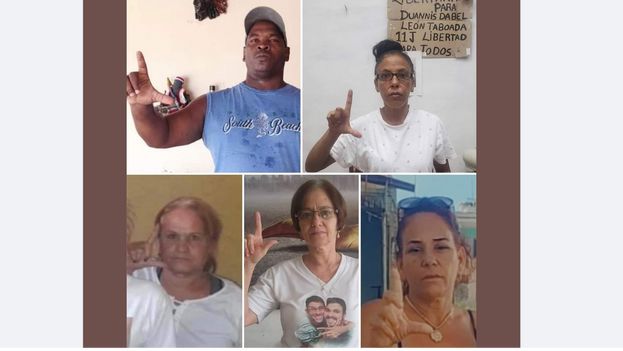
![]() EFE/14ymedio, Havana, 17 November 2022 — Cuban organization Justicia 11J denounced on Wednesday the arrest of six relatives of people arrested for protesting on July 11, 2021 in the largest antigovernment protests in decades on the Island.
EFE/14ymedio, Havana, 17 November 2022 — Cuban organization Justicia 11J denounced on Wednesday the arrest of six relatives of people arrested for protesting on July 11, 2021 in the largest antigovernment protests in decades on the Island.
The arrests took place, according to this organization, “to prevent their attendance” at the United States Embassy in Cuba where a State Department delegation was visiting the Island.
Three of the family members have already been released and two more have not been able to leave their homes which are surrounded by a police perimeter, according to the NGO.
The Cuban independent media outlet, El Toque, added that the events occurred on Wednesday and that those involved were attempting to reach the embassy “for the visit” of the Deputy Assistant Secretary for Western Hemisphere Affairs, Emily Mendrala.
The Embassy has condemned the events in a communication on social media. “We condemn the Cuban government’s detention of family members of imprisoned #11J protesters who were scheduled to meet with American officials today in Havana. Preventing parents from talking about their jailed children is unjust and inhumane,” states the message.
“These families,” it continues, “have a right to speak to the international community and anyone else they choose regarding the condition of their loved ones. We join calls for the Cuban government to immediately release all those unjustly detained.”
Deputy Assistant Secretary Emily Mendrala is the head of a delegation that, on Tuesday, held a round of conversations in Havana on irregular migration with representatives from the Cuban government led by Vice Minister of Foreign Relations, Carlos Fernández de Cossio.
The trials of the July 11, 2021 protesters have been taking place in Cuba since the end of 2021 while family members of those convicted and NGOs have criticized them for their lack of due process guarantees, fabrication of evidence and the long sentences.
Foreign media do not have access to the trials, nor do organizations such as Amnesty International, which had put in a request, nor the ambassadors of some European countries who tried unsuccessfully to attend.
Cuba’s Supreme Court states that due process has been adhered to in all of the 11J cases.
According to the NGOs Cubalex and Justicia 11J, following last year’s protests close to 600 sentences have been handed down, some as long as 30 years in jail.
Since July of this year protests have been documented throughout the country, especially in the last several days due to frequent blackouts and the handling of the impact of Hurricane Ian on the national electric system.
The Observatory of Cuban Conflict (OCC), based in Miami, logged 589 protests in October, five more than those documemented in July 2021.
The Cuban Attorney General warned at the beginning of last month that it will investigate the recent protests and that criminal acts “will receive the corresponding criminal judicial response.”
Translated by: Silvia Suarez
____________
COLLABORATE WITH OUR WORK: The 14ymedio team is committed to practicing serious journalism that reflects Cuba’s reality in all its depth. Thank you for joining us on this long journey. We invite you to continue supporting us by becoming a member of 14ymedio now. Together we can continue transforming journalism in Cuba.
